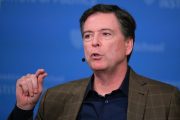With Bernie Sanders surging and the economy-aided Trump train rolling, Republicans are overjoyed and Democrats overwrought. Or at least that’s the conventional wisdom. In reality, a growing number of rank-and-file Democrats believe the socialist senator offers the best chance to beat the president in November.
Yet whether or not Sanders is the most palatable choice, cultural change and Big Tech manipulation may mean he can prevail. In fact, an expert who has studied the latter has flat-out said that the “Republicans can’t win in 2020” — no matter who the Democrat nominee is.
Sanders’ resounding Nevada caucus win and undeniable frontrunner status is causing establishment Democrat agita, and his electability was a major topic at Tuesday’s debate in South Carolina. Yet Reuters reports that the Vermont socialist’s rise is raising the hopes of some Democrat voters.
“Some 26% of Democrats and independents polled [by Reuters/Ipsos] Feb. 17-25 said they believed Sanders was the strongest Democrat in a head-to-head matchup with Trump, compared with 20% who picked billionaire businessman Michael Bloomberg and 17% who named former Vice President Joe Biden,” Reuters relates.
“That was a big change from a month earlier, when 27% of respondents gave Biden the edge, and just 17% thought Sanders could beat Trump.”
Of course, “hope is not a strategy,” as is said, and conventional thinking holds that Sanders is fatally flawed. He’s physically unappealing (yes, looks influence people), devoid of charm, and arguably unhealthy. Besides, Americans would never elect a socialist, right? But President Trump’s surprise 2016 victory instructs that conventional thinking doesn’t hold today.
Many analysts are saying that Sanders as nominee would mean another 1972, when incumbent president Richard Nixon won 49 states in a landslide over far-left George McGovern. But as commentator Bob Maistros rhetorically asked about these observers, “What country are they are living in?”
Maistros points out that 1972’s “bugaboos are mere yawners today.” Elaborating, he mentions that he was shown Reefer Madness in school in 1970 to deter pot use; now many are mad about legalizing reefer. In ’72, “Roe v. Wade hadn’t even been decided, and most Democratic Party leaders — even Teddy Kennedy — were pro-life,” Maistros also explains.
Moreover, just “before the 1972 election, the Supreme Court refused even to take up a same-sex marriage case, citing ‘want of a substantial federal question.’ (Legalese for ‘say what?’),” the writer continued. “Fear of men and women sharing bathrooms? Almost enough in and of itself to sink the Equal Rights Amendment, sent to the states for ratification that year. What’s happened since? You know.”
And the wise know that, if anything, Maistros understates the case. The United States has changed so much demographically, culturally, ideologically, morally, and religiously over the last several decades that ’72-era Americans wouldn’t even recognize it. And Soviet defector and ex-KGB agent Yuri Bezmenov warned about our country in the mid-’80s already that the process of “demoralization” — undermining the morals of a nation so it invites its own destruction — was “more than complete.” How would he describe it now, 35 years later?
Yet while Maistros says that Sanders can win, researcher Dr. Robert Epstein flat-out says Republicans can’t. Why? Big Tech manipulation.
Professor Tim Groseclose wrote in 2011 that conventional media “bias aids Democratic candidates by about 8 to 10 percentage points in a typical election.” While he might have underestimated the bias’ effect, the reality is that, either way, it’s small potatoes compared to Big Tech’s staggering power.
Epstein, a Democrat-favoring liberal psychologist who doesn’t support Trump, wrote recently that in “President Eisenhower’s famous 1961 farewell address, he warned not only about the rise of a military-industrial complex; he also warned about the rise of a ‘technological elite’ who could someday control our country without us knowing.”
“That day has come,” he laments.
Relating the findings of rigorous research he has conducted on the matter since 2013, Epstein writes, if “our own tech companies all favor the same presidential candidate this year — and that seems likely — I calculate that they can easily shift 15 million votes to that candidate without people knowing and without leaving a paper trail.”
Looking back on the last eight elections and 32 years, no president — not either of the Bushes, Clinton, Obama, or Trump — has won by more than 9.5 million votes. Shifting 15 million is easily enough to turn any modern election.
(Add to this the coronavirus wild card. If the disease continues spreading, causes a worldwide recession and social disruption and death in the US, the media will unfairly blame Trump.)
Of course, perhaps unlike Maistros, Epstein overstates his case. Regardless, it won’t be Trump vs. the Democrat nominee in November. It will Trump vs. the Democrat nominee and political and cultural pseudo-elites — and a Big Tech leviathan whose vox populi-crushing power is unprecedented in world history.
Photo: AP Images
Selwyn Duke (@SelwynDuke) has written for The New American for more than a decade. He has also written for The Hill, Observer, The American Conservative, WorldNetDaily, American Thinker, and many other print and online publications. In addition, he has contributed to college textbooks published by Gale-Cengage Learning, has appeared on television, and is a frequent guest on radio.




